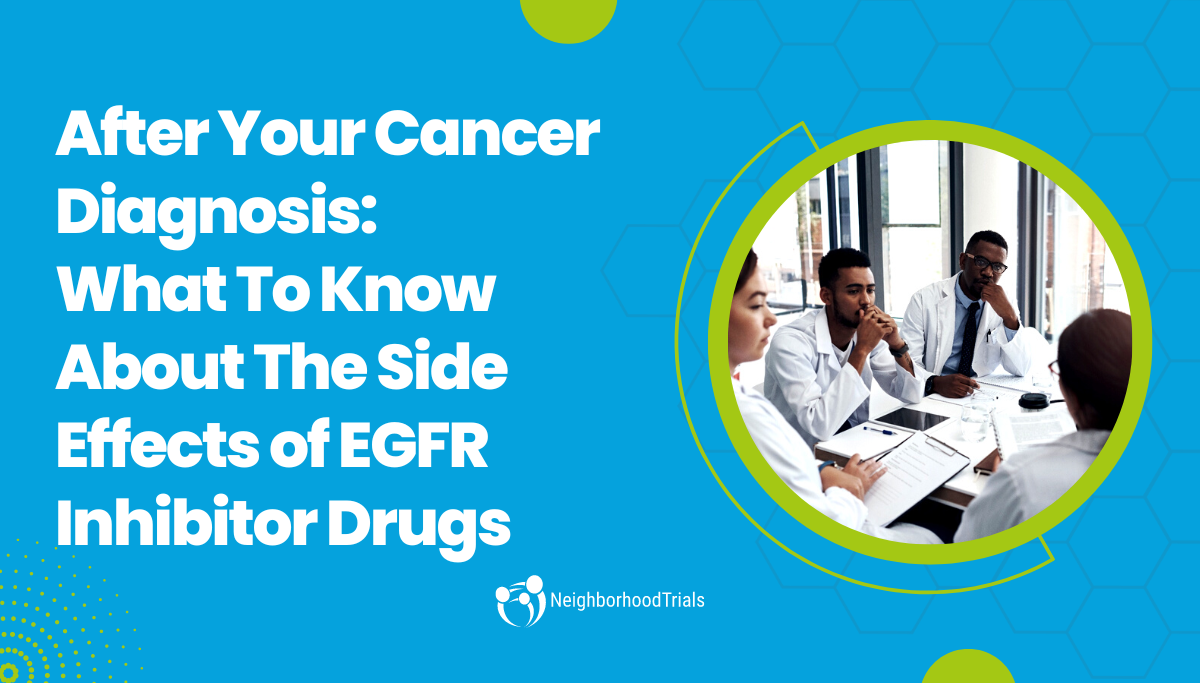After Your Cancer Diagnosis: What To Know About The Side Effects of EGFR Inhibitor Drugs
Receiving a cancer diagnosis can be overwhelming, especially if you have a more aggressive type of cancer or discover it at a more advanced stage.
After your diagnosis, you can expect to receive a comprehensive treatment plan that may include surgery, radiation therapy, chemotherapy and other targeted therapies depending on the type of cancer you have. If your cancer is more advanced or resistant to other drugs, you may be prescribed EGFR inhibitor drugs, which have proven to be effective in slowing the progression of several types of cancers, including lung cancer, colon cancer, breast cancer, thyroid cancer and pancreatic cancer.
Unfortunately, these drugs can come with uncomfortable side effects for patients.
If you or someone you know is considering taking these drugs to treat cancer, here’s what you should know.
When are EGFR inhibitor drugs prescribed for cancer patients?
Epidermal growth factor receptor (EGFR) is a protein that promotes cell growth. When an EGFR gene has a mutation, it can grow too much, causing cancer. EGFR inhibitor drugs are designed to slow down or stop cell growth in patients with this gene mutation. While they do not cure the cancer, they are used alongside other treatments, such as chemotherapy, to control the progression.
These drugs are most commonly prescribed during or after:
Treatment for non small-cell lung cancer
About 10-15% of lung cancers are considered EGFR-positive, according to the American Lung Association. EGFR-positive lung cancer is more common in patients without a history of smoking. If your cancer is detected early and you’re eligible for surgery, you may be prescribed an EGFR inhibitor pill to keep it from coming back. EGFR inhibitors may also be prescribed to keep late-stage lung cancer from progressing.
Colorectal cancer treatment
As many as 25% of colorectal cancer cases are diagnosed when they are already at an advanced stage, according to the National Library of Medicine. Because EGFRs play a role in as many as 25-82% of these cancers, your oncologist may prescribe EGFR inhibitors in addition to chemotherapy, surgery or nanotherapy that targets the tumor.
Treatment for certain types of breast cancer
Certain types of breast cancer tend to have an overexpression of EGFRs, which can make them more aggressive and more difficult to treat. Research shows they contribute to about 14% of breast tumors and tend to be more common in hereditary breast cancer. EGFRs also tend to be overexpressed in triple negative breast cancer, which is characterized by a reduced expression of estrogen, progesterone and Her2 receptors. This type of breast cancer is more likely to spread quickly and be more resistant to cancer drugs.
EGFR inhibitors can also reduce the risk of recurrence of early-stage breast cancer with human epidermal growth factor receptors known as HER2, which causes cells to grow and divide quickly.
Treating advanced drug-resistant thyroid cancer
Tyrosine kinase inhibitors (TKIs) are oral medications, such as levatinib, used to treat advanced thyroid cancer. However, some types of cancer are resistant to these treatments. Research has shown EGFR inhibitors may help patients overcome this resistance.
What are common EGFR inhibitor drugs?
As of 2021, 14 EGFR small-molecule inhibitors had been approved for cancer treatment, according to the National Library of Medicine.
Common names include:
Tarceva
Known by the generic name erlotinib, Tarceva is often used to treat lung cancer and pancreatic cancer that has spread to other parts of the body.
Tagrisso
Known by the generic name osimertinib, Tagrisso has been shown to improve the median overall survival rate for patients with Stage 4 lung cancer.



